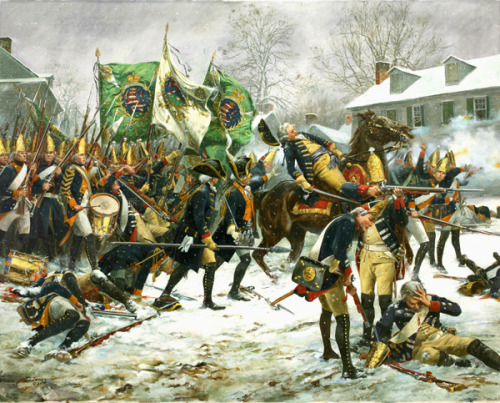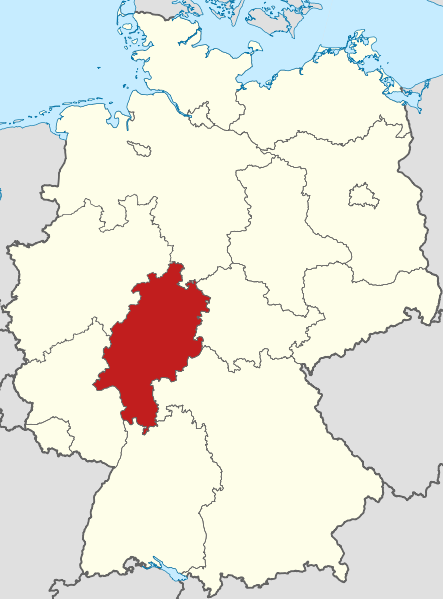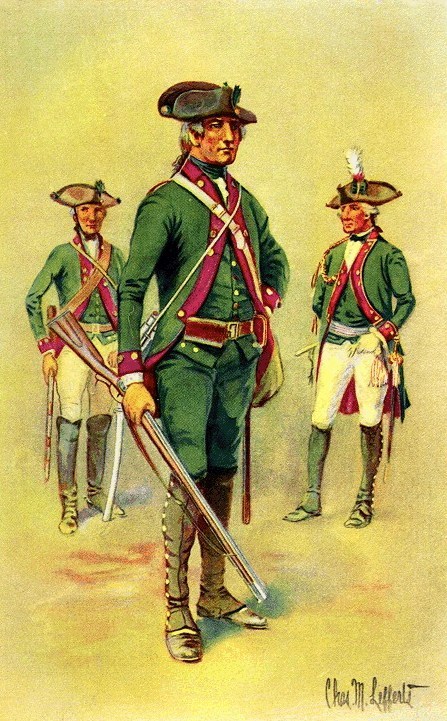Who Were the Hessians?During the American Revolution the British Army brought along 30,000 mercenari
Who Were the Hessians?During the American Revolution the British Army brought along 30,000 mercenaries called “Hessians”. Hired from Germany, the use of Hessian soldiers caused much controversy as their presence was used as a propaganda tool by the American colonists as an example of further tyranny by the British. The Declaration of Independence itself mentions the Hessians in a grievance against the King,“He is at this time transporting large Armies of foreign Mercenaries to compleat the works of death, desolation, and tyranny, already begun with circumstances of Cruelty & Perfidy scarcely paralleled in the most barbarous ages, and totally unworthy the Head of a civilized nation.”The incredibly strong language of the Declaration of Independence clearly shows that the Hessians were not very well likde men in the colonies. Perhaps their greatest legacy during the Revolution was their defeat at the hands of George Washington. On Christmas night of 1776, George Washington and his Continental Army crossed the Delaware and mounted a successful surprise attack on a Hessian force at Trenton New Jersey. The reputation of the Hessians was even known to Washington, who met the Hessian commander at Trenton, Col. Johan Rall, with scorn and anger even though the colonel was mortally wounded. While the Hessians make a profound mark on early American history, high school history classes never usually expound on who the Hessians were. Who were the Hessians, where did they come from, and why were they fighting someone else’s war thousands of miles from their homes?During the 18th Century Germany was divided into dozens of small independent kingdoms, fiefdoms, dukedoms, and city states. In the region of Hesse, located in central Germany, the noble house of Hesse ruled the kingdom and divided it among its many family members. As a result Hesse was a motley collection of small semi-independent realms ruled by Hessian princes and dukes. Despite ruling over small strips of territory (Principalities) that barely formed a unified and working kingdom, the Hessian states had some of the wealthiest nobleman in Europe. The Principalities of Hesse had little in the way of resources, and the Hesse-Kassel region itself only sported a population of poor peasant farmers. The one resource the Hessian princes could rely upon was manpower. As early as the 17th century, German kingdoms began raising regiments of soldiers for hire. Unlike common footsoldiers in larger armies, such as that of the British, Spanish, or French, the regiments created by the Hessian Principalities were elite troops which were very well trained and equipped with the best in military arms. This made the soldiers of Hesse some of the best soldiers in the world. However, the Hessian princes did not use their soldiers for defense or to settle matters of foreign policy. Rather the Hessians used their soldiers as a source of revenue for their respective principalities. Because they were considered to be among the best soldiers of Europe, they were highly attractive to foreign powers embroiled in war. Thus the princes of Hesse leased their regiments to armies around Europe for a handsome profit. Other German states raised mercenaries as well, but were called Hessians regardless. As a result, Hessian mercenaries fought in wars all over Europe and the world, including Italy, Spain, Denmark, Sweden, France, Ireland, Scotland, Bavaria, and the British colonies of North America. It was even common for Hessian soldiers to face each other in battle on opposing sides, as was the case where Hessian mercenaries were hired by both sides in the War of Austrian Succession.Hessian soldiers themselves saw little of this money, but were rather paid a regular salary. Despite their small cut of the riches, life in the Hessian regiments was brutal. Discipline was strict, with brutal punishments such as flogging exacted for even simple infractions. Hessian soldiers served a term of 24 years before being discharged. The penalty for desertion was death. More importantly many Hessians rarely volunteered for service. Most were conscripts, drafted by the prince for his army. Men were even kidnapped into the service, abducted by force by press gangs and crimpers. The result of this practice was that Hesse became one of the most militarized societies in the world, with one in fourteen people serving in the Hessian Army. Hessian uniforms typically were either green or blue, with regular infantry wearing bi-corn or tri-corn hats and grenadiers wearing cone shaped brass mitres. Most Hessians were armed with a flintlock musket, although a few regiments of rifleman were known to operate.While the Hessians were sold to kingdoms and empires all over Europe, perhaps their best customers were the British, who made use of their services on a number of occasions during the 1700’s. Often the British were given special discounts as the ruling kings of Britain were Germans from the House of Hannover. The height of the Hessians came during the Revolutionary War when the British Parliament purchased 15,000 Hessian soldiers as well as another 15,000 German mercenaries. While the Hessian mercenaries provided much needed manpower (25% of British forces), their use backfired by further enraging colonists against Britain and alienating loyalists. Even ministers in Parliament deplored the use of foreign mercenaries against British subjects. The colonists themselves would sway many Hessians to defect by offering grants of land if they switched sides. To many Hessians, who were conscripts forced to fight for the profit of their princes, it sounded like a pretty good deal. Many eagerly accepted the colonists offer. Of 30,000 around 5,000 Hessians would settle in America. In the early 1800’s Napoleon Bonaparte conquered Germany and Hesse with it, effectively bringing an end to the Hessian mercenary system. Thousands of Hessians served in Napoleon’s Grande Armee, most of whom died during Napoleon’s invasion of Russia. After the Napoleonic Wars some Hessian regiments still hired out their services, but only rarely. -- source link
Tumblr Blog : peashooter85.tumblr.com
#history#soldiers#hessians#hesse#germany#germans#american revolution#war#mercenaries#revolutionary war


